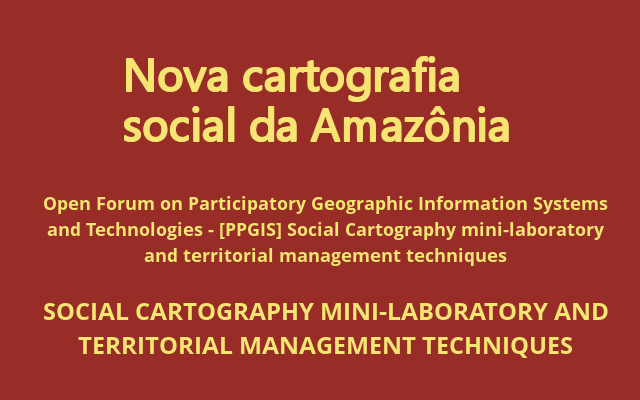
In the period of October 2011 to December 2012, just as predicted in the chronogram for the Project “Social Mapping as an instrument for territorial management against deforestation and devastation – preparation process for traditional peoples and communities” – Fundo Amazônia – BNDES, developed in the scope of UEA (Universidade do Estado do Amazonas/ State University of the Amazonas-Brazil), numerous research activities were realized, that can be summarized as follows: inter-nucleus contacts, the realization of preparatory meetings and regional meetings, map workshops and the installation of social cartography mini-laboratories in the educational establishments of nine federation units related to the Project action. The installation of these mini-laboratories and their relation to the social cartography laboratory of the Project headquarters, mark the assembly of an indispensable operational structure for articulated action between the different research nucleuses, joining technological innovation and ethnographic research in traditional communities.
The most outstanding activity in the physical infrastructure and technical base plan, during the first 15 months of work, that is, from October 2011 to December 2012, consisted in actions related to the installation of small laboratories and training courses in “basic cartography” and GPS training in various education and research units, distributed not only by Amazonas State, in the scope of the State University of the Amazons (UEA) and the Federal University of the Amazons (UFAM), in the municipalities of Tabatinga, Parintins, Humaitá, Benjamin Constant and Lábrea, but also by other federation units developing Project activities in their public universities. These include: The Federal University of Pará-NAEA, Federal University of Pará – Marabá Campus, West Federal University of Pará-UFOPA, Federal University of Roraima (UFRR), Federal University of Acre (UFAC), State University of Maranhão (UEMA), Federal University of Rondônia (UNIR) and the Federal University of Amapá (UFAP).
The social cartography mini-laboratories basically consist of the installation of fundamental equipment (computers, GPS, printer, video camera, scanner, portable scanner, voice recorder, camera, data-show projectors and licensed ArcGIS-v.10.1) in higher education units in the interior Amazon region, properly accompanied by the appropriate technical-scientific training, capable of providing for the researchers of these university establishments and members of local communities, conditions for access to essential software for the execution of social mapping and territorial monitoring. Beginning in November of 2012 we proceeded with software updating, incorporating the ArcGIS version 10.1, which, besides being a more advanced program, presents more possibilities for wider use. This version is also available in Portuguese, as well as being more intensively used in the courses, providing a wider spread (to more people) of mapping techniques, especially for members of local communities. Due to high operational costs, a plotter was not incorporated into the mini-laboratories.
Instead a system was adopted, to solicit eventual rendered services by specialized copier businesses.
Thus, a more detailed description of the mini-laboratories can be presented as follows: The first tasks consist in preliminary initiatives for implementation, when there is no suitable definitive installation of small social cartography laboratories in higher education centers of public universities in the Amazon region, located in the capital cities and especially the interior. The installation work in physical space combined with the local demands of mapping emphasizes technological resources that may come to provide conditions for possibilities, contributing directly to the consolidation of a scientific work standard in regular degree courses, as well as postgraduate courses in these universities, concerned primarily with localized realities and real processes. The empirical situation of reference especially concerns the situation of traditional peoples and communities that use forest resources and which maintain historical practices that impede predatory acts of deforestation and devastation in their respective territories.
For a more complete description, it can be stressed that since November 2011 the ArcGIS version 10 license has been made available, as well as the version 10.1 beginning in November 2012. Therefore, the licenses were properly updated after the version 10 became available for all of the education centers that were interested in such software.
Simultaneously, training for the local teams was granted, spreading mapping technologies and fundamental procedures for scientific research that could contribute to the monitoring of the traditionally occupied lands and their own actions of intrusion and/or deforestation and devastation of essential natural resources for community life development. With this initiative, the possibilities for future territorial self-management, with active defense for the conservation of natural resources, becomes more plausible.
Alfredo Wagner Berno de Almeida
Luís Augusto Pereira Lima
Helen Catalina Ubinger

